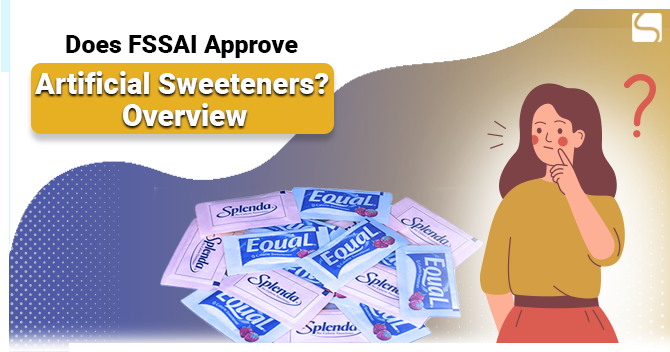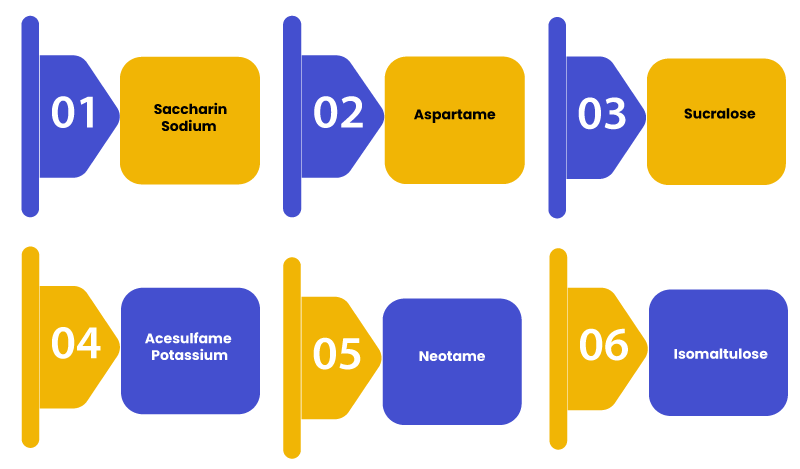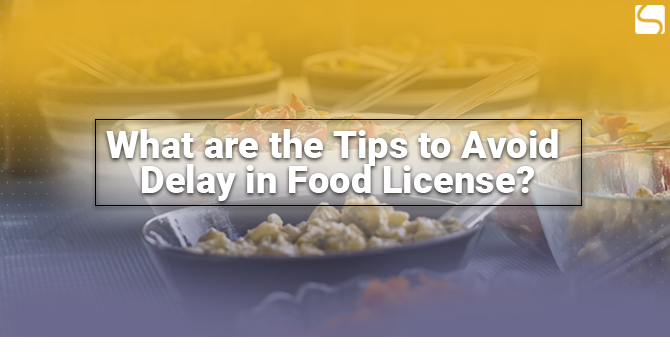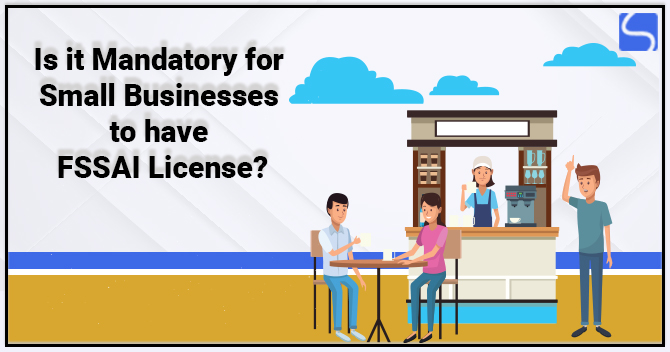Does FSSAI Approve Artificial Sweeteners? – Overview

Karan Singh | Updated: Jan 28, 2021 | Category: FSSAI
Yes, there are some artificial sweeteners that are approved by FSSAI. An artificial sweetener is an artificial sugar substitute that imparts a sweet taste similar to natural sugar but fewer calories. As you know, sugar is the most commonly used ingredient in foods, and it is found in cakes, bread, candies, processed foods, etc. Many companies who have FSSAI Registration Certificate can use an artificial sweetener in these types of foods, which is a food additive, and it tastes similar to natural sugar. Due to the rising of diseases like diabetes, sugar consumption substitutes has increased. Sugar substitute or artificial sugar don does not add nutritional value to food. In this article, we discuss the list of all artificial sweeteners which has been approved by FSSAI.
Table of Contents
What are the Sugar-Sweetened Beverages?
- These beverages are any liquids that are sweetened with several forms of added sugars such as corn syrup, fructose, honey, lactose, brown sugar, malt syrup, corn sweetener, raw sugar, high-fructose corn syrup, maltose, glucose, sucrose, etc.
- Some examples of sugar-sweetened drinks contain but are not limited to regular soda (not sugar-free), sports drinks, fruit drinks, energy drinks, tea, coffee, and sweetened water beverages with some added sugars.
Recommended standards for artificial sweeteners by FSSAI
FSSAI has approved six different artificial sweeteners, and you can check the list of the same below:

- Saccharin Sodium: It was discovered in 1879, and it is the oldest artificial sweetener in the world. This artificial sweetener is currently used in fruit juices, mixes, and bases as a sugar substitute in serving and cooking in processed foods. This sweetener is around 200 to 700 times sweeter than the regular sugar, and it has zero calories. Many studies have proved that this sweetener is safe for humans. FSSAI recommends the maximum levels of saccharin sodium in the following foods as below:
- Soft drinks (100 ppm).
- Pan Masala (8000 ppm).
- Traditional sweets (500 ppm).
- Chocolate (500 ppm).
- Sugar-based or sugar-free confectionery (3000 ppm).
- Chewing gum or bubble gum (3000 ppm).
- Aspartame: This artificial sweetener is two hundred times sweeter than normal sugar, and it has zero calories. If you heat this sweetener, then it loses its sweetener that’s why it is not used in baked goods. More than 100 studies have proved that aspartame is safe for humans, including pregnant women, and children. FSSAI recommends the maximum levels of aspartame in the following foods as below:
- Soft drinks (700 ppm).
- Biscuits, bread, cakes and pastries (2200 ppm).
- Traditional sweets (200 ppm).
- Jam, jellies and marmalades (1000 ppm).
- Chocolate (2000 ppm).
- Sugar-based/sugar-free confectionery (10000 ppm).
- Chewing gum/bubble gum (10000 ppm).
- Custard powder mix (1000 ppm).
- Fruit/vegetable nectar (600 ppm).
- Icy dessert, Ice cream, and sweet (1000 ppm).
- Flavored milk (600 ppm).
- Ready to serve tea/coffee-based beverages (600 ppm).
- Yoghurt (600 ppm).
- Sucralose: This sweetener is approximately 600 times sweeter than natural sugar, and it is a zero-calorie artificial sweetener. This sweetener is used in high temperature cooking like baking because its sweetness remains constant even in high temperature. Sucralose is also used in frozen dairy desserts, chewing gums, baked goods, and beverages. FSSAI recommends the maximum levels of sucralose in the following foods as below:
- Soft drinks (300 ppm).
- Pieces of bread, biscuits, cakes, and pastries (750 ppm).
- Traditional sweets (750 ppm).
- Yoghurt (300 ppm).
- Kulfi or icy dessert or dried ice cream mixes or ice cream (400 ppm).
- Ice lollies/ice candy (800 ppm).
- Jam, jellies, and marmalades (450 ppm).
- Chutney (800 ppm).
- Confectionery (1500 ppm).
- Chocolate (800 ppm).
- Chewing gum (1250 ppm).
- Doughnuts /scones /muffins (800 ppm).
- Ready to serve tea/coffee-based beverages (600 ppm).
- Vegetable juice/nectar (250 ppm).
- Custard powder or custard dessert (260 ppm).
- Acesulfame Potassium: It is also named as Acesulfame K (Ace-K), and it is approximately 200 times sweeter than natural sugar, and it is a calorie-free sweetener. This sweetener is used in many food products, including dairy products, jams, chewing gum, soft drinks, etc. Acesulfame Potassium or Ace-K is safe and at recommended levels of consumption is not poisonous and daily consumption of this sweetener is 9mg/Kg body weight. Acesulfame K is recommended by FSSAI (Food Safety and Standards Authority of India) for use in the following foodstuff at the maximum levels:
- Soft drinks (300 ppm).
- Biscuits, bread, cakes and pastries (1000 ppm).
- Traditional sweets (500 ppm).
- Chocolate (500 ppm).
- Sugar-based/ Sugar-free confectionery (3500 ppm).
- Chewing gum/ bubble gum (5000 ppm).
- Ready to serve tea/coffee-based beverages (600 ppm).
- Ice lollies/ice candy (800 ppm).
- Fruit nectars (300 ppm).
- Neotame: This artificial sweetener is derived from aspartame approved in 2002 for use in drinks and food products, but the use of this sweetener is mostly limited. Neotame is approximately 7000 to 13000 times sweeter than natural sugar and around 30 to 60 times sweeter than aspartame. FSSAI recommended using neotame in soft drinks only at a maximum permitted level of 33 ppm.
- Isomaltulose: This artificial sweetener is used in the confectionery products, and the maximum limit is 50% of total sugar. Isomaltulose has been added to the list of sweeteners in Regulation No. 3.1 of Food Products Standards and Food Additives Regulations, 2011. This sweetener is allowed to be used for the following products:
- Chewing gum/bubble gum (GMP).
- Sugar-based/ sugar-free confectionary (GMP).
- Chocolate (GMP).
- Lozenges (GMP).
What is the difference between Non-Artificial and Artificial Sweetener?
Non-artificial sugars add some caloric value to the foods, while artificial sugars are very low in calories or contain no calories. Especially, aspartame is the only approved nutritive high-intensity sweetener, and it has more than 2% of the calories in an equal amount of sugar as opposed to artificial sugar that contains less than 2% of the calories in an equal sugar amount.
Conclusion
FSSAI has been making changes to the regulations and food safety with respect to artificial sweeteners. It is purely due to the increased sugar consumption in daily foods. However, FSSAI has looked to maintain a balance between healthy amounts of artificial sugars consumption for consumers. All the manufacturers need to follow all the standards, rules, and regulations prescribed by the Food Safety and Standards Authority of India.
Also, Read: What are the Licenses Required to Start a Food Van in India?













